Fr. Andreas landed in Kenya’s capital city, Nairobi, on November 8 ahead of a tight schedule that would have him visit Misereor partners in five Catholic Dioceses in nine days.
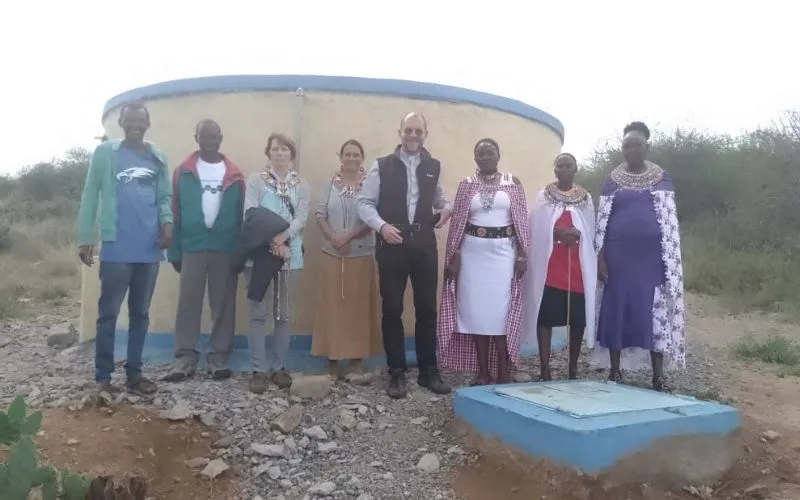 Rehabilitated borehole in Laikipia North. Credit: Misereor/Kenya
Rehabilitated borehole in Laikipia North. Credit: Misereor/Kenya
He started off encounters on November 9, meeting with representatives of the Parliament Liaison Office, a department of the Kenya Conference of Catholic Bishops (KCCB), the common assembly of Catholic Bishops in the East African nation with a Secretariat in the Catholic Archdiocese of Nairobi (ADN).
Fr. Andreas also interacted with representatives of the Independent Medico-Legal Unit (IMLU) on the theme, “Human rights, support for victims of state violence and torture”.
A meeting with the Apostolic Nuncio in Kenya, Archbishop Hubertus van Megen, concluded Fr. Andreas’ first full day in Kenya. He left Nairobi for the Catholic Diocese of Meru on November 10, a journey of just under five hours. Activities in the Kenyan Diocese included a dinner meeting with the Local Ordinary, Bishop Salesius Mugambi, and on November 11, an encounter with the stakeholders of the Diocese of Meru Water and Sanitation Services (DOMWASS).
(Story continues below)
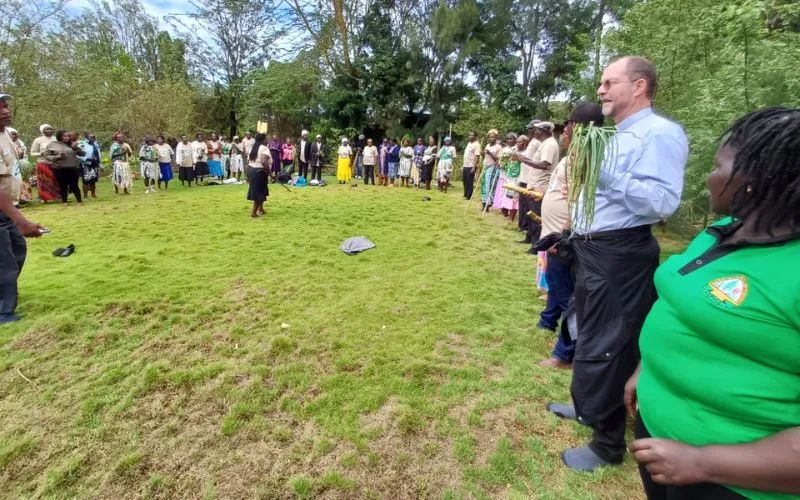 Fr. Andreas Frick with Seed Savers partners in Gilgil, Nakuru Diocese. Credit: Misereor/Kenya
Fr. Andreas Frick with Seed Savers partners in Gilgil, Nakuru Diocese. Credit: Misereor/Kenya
The Director General of Misereor had encounters with partners in the Catholic Diocese of Embu, including Caritas Embu and Don Bosco Embu, the latter meeting involving partners at the Technical Vocational Education and Training (TVET) that is under the auspices of the Salesians of Don Bosco (SDB).
In the Catholic Archdiocese of Nyeri, Fr. Andreas had encounters with IMPACT Trust Kenya partners in Nanyuki, an “indigenous movement for peace advancement and conflict transformation”, including advancing human rights of indigenous groups, livelihoods, and water.
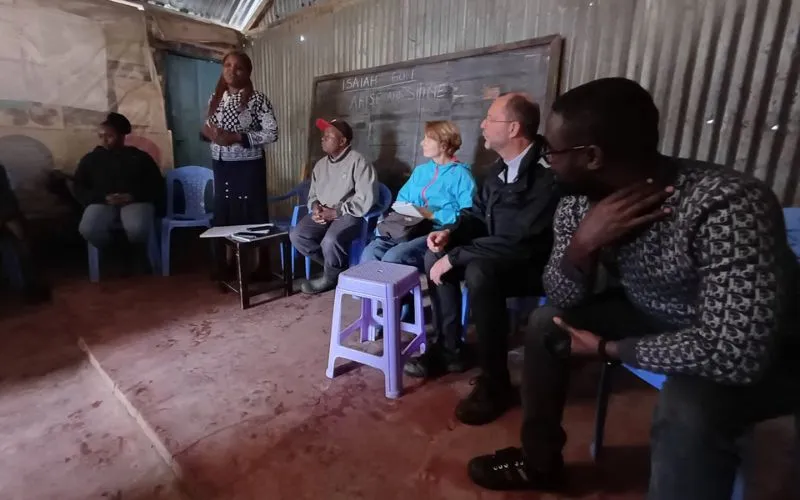 Fr. Andreas Frick and Katharina Götte meeting Misereor partners in Huruma, Nairobi Archdiocese. Credit: Misereor/Kenya
Fr. Andreas Frick and Katharina Götte meeting Misereor partners in Huruma, Nairobi Archdiocese. Credit: Misereor/Kenya
For two days in the Catholic Diocese of Nakuru, November 14-15, the Misereor Director General interacted with partners at Kenya Land Alliance (KLA) that advances land rights and Seed Savers, who advocate for rights of farmers, their access to seeds, and rural development.
He returned to Nairobi on November 15 evening, ahead of his meeting with partners at Pamoja Trust (PT), who delve into urban development, the lobbying and Advocacy for groups in informal settlements; and Kituo cha Sheria, where there is facilitation for access to justice and legal support.
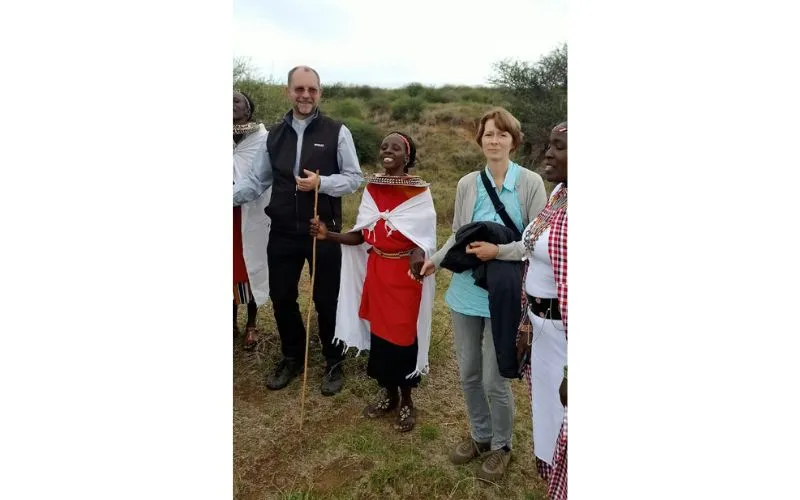 Credit: Misereor/Kenya
Credit: Misereor/Kenya
Dinner meeting with the Local Ordinary of ADN, Archbishop Philip Anyolo on November 17, was preceded by a visit to Ufanisi Center, where urban development, clean environment, and advocacy are promoted.
In the November 17 interview with ACI Africa, Fr. Andreas described Misereor as “a work of the German church, of the German Bishops, of the faithful in Germany to overcome hunger, disease, poverty in the world and to do a lot that people are strengthened in their own activities and responsibilities.”
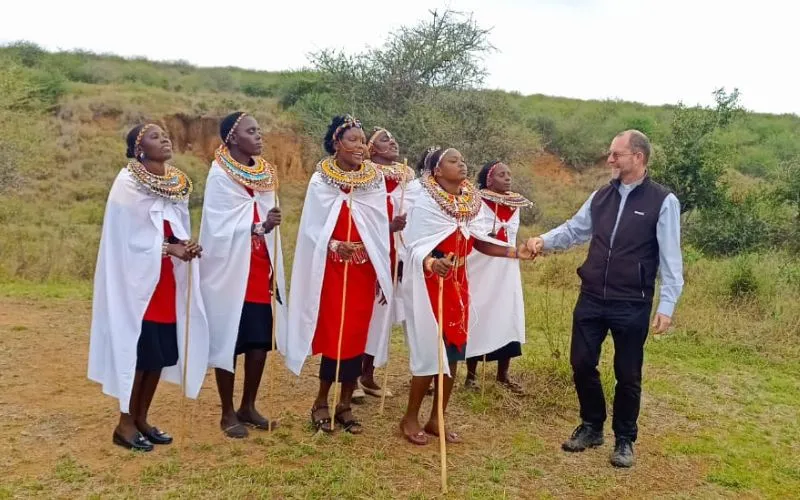 Credit: Misereor/Kenya
Credit: Misereor/Kenya
“We don't do our own projects, but we try to know projects and to help” partners starting off initiatives, evaluating projects, or “perhaps on continuing their work ... There are some programs, which we only accompany for shorter periods and there are some projects we are helping for a long time, he further said.
The German Catholic Priest, who previously served as Vicar General and Financial Administrator of his native Diocese of Aachen described the encounters he had with Misereor partners in the five Kenyan Episcopal Sees as “a very big richness of meetings”.
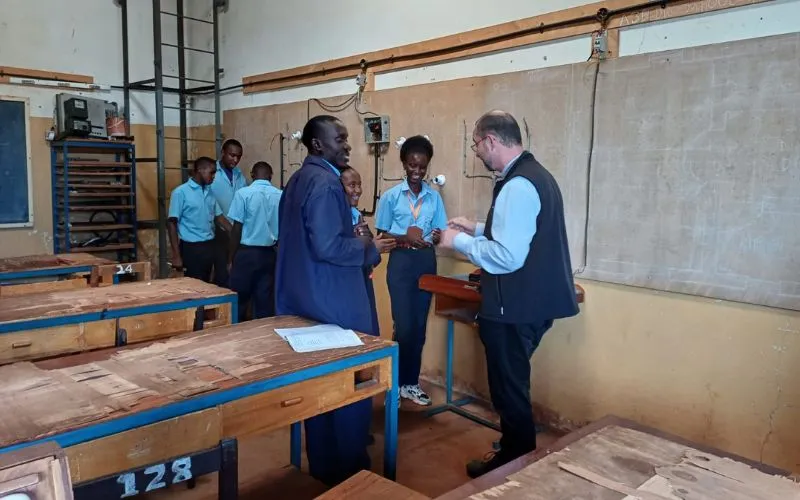 Fr. Andreas Frick at Don Bosco Technical Institute, Catholic Diocese of Embu.Credit: Misereor/Kenya
Fr. Andreas Frick at Don Bosco Technical Institute, Catholic Diocese of Embu.Credit: Misereor/Kenya
He said Misereor was having an impact on the people of God through partnerships realized in the over 2,500 projects across the globe that he said are implemented by institutions of the Catholic Church, Christians, and other “very good projects done in the civil society where Christians are present and give their values.”
“All these values are very (tangible) and we are proud to be in certain moments a help for this,” Fr. Andreas said and referring to the mission of Misereor added, “To overcome poverty, hunger, disease, we need not only first aid, but we need as well structures of education, lawyers' help, (and) knowing how to handle certain procedures.”
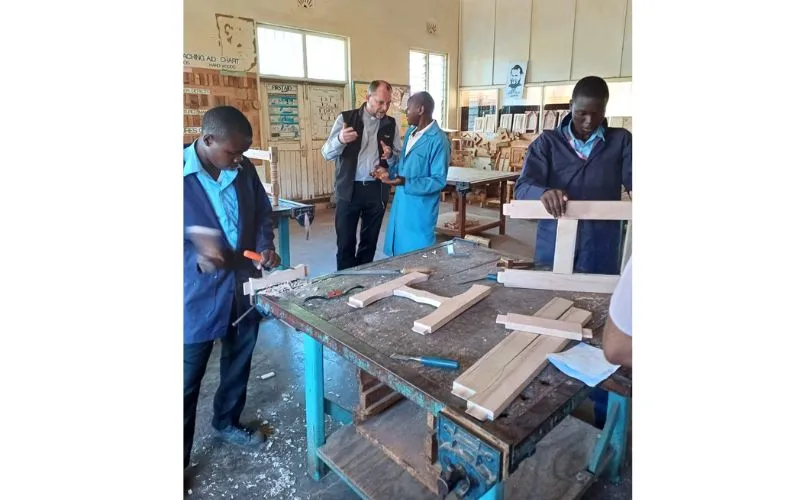 Credit: Misereor/Kenya
Credit: Misereor/Kenya
In his interactions with Misereor partners in Kenya, Fr. Andreas said he had experienced a spirit of positive change, which he described as “the spirit of reconstructing a human society, which is part of the mission of the church.”
Alluding to the November 14 press conference that Kenya’s Catholic Bishops convened to fault the government for perpetrating a “culture of lies”, failure “to fulfil its promises”, and “reported abductions” among other criticisms, Fr. Andreas hailed KCCB members for speaking out “very clearly”.
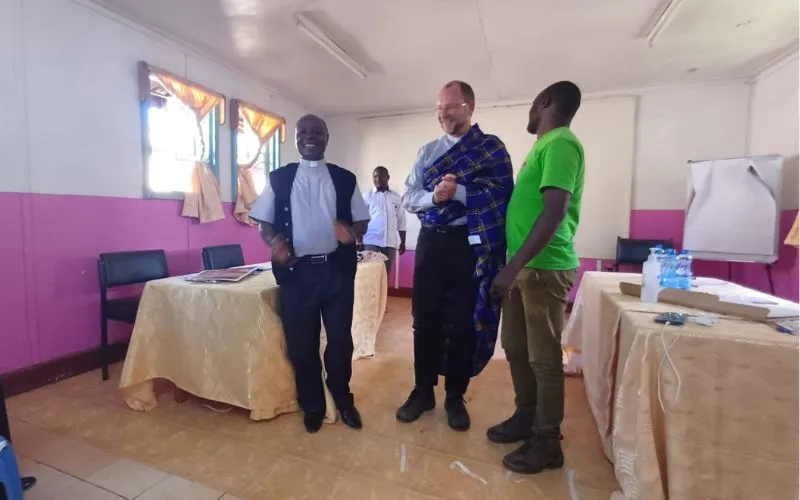 Credit: Misereor/Kenya
Credit: Misereor/Kenya
The Director General, who also represents Misereor in the supervisory council of the international alliance of Catholic social justice and development agencies in Europe and North America, CIDSE, lauded Kenya’s civil society for fostering courses akin to the mission of Misereor.
Also speaking to ACI Africa, Katharina Götte, a member of Misereor’s Africa Desk echoed the sentiments of Fr. Andreas about the important role the civil society is playing in Kenya.
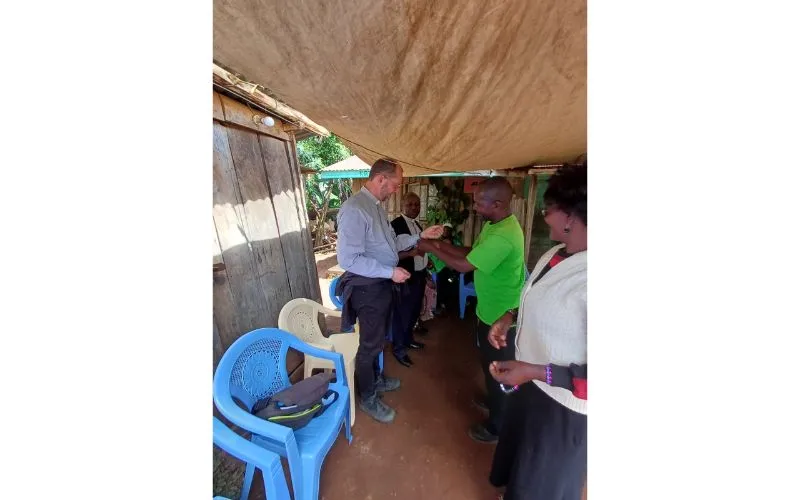 Credit: Misereor/Kenya
Credit: Misereor/Kenya
“I think the Kenyan civil society including the Church, the Catholic Church, is very engaged in bringing this country forward,” Ms. Katharina said.
The civil societies’ engagement, she added, is exemplified in “giving messages to politicians and really having a great ownership in their own activities on all levels in the rural areas and in the urban areas.”
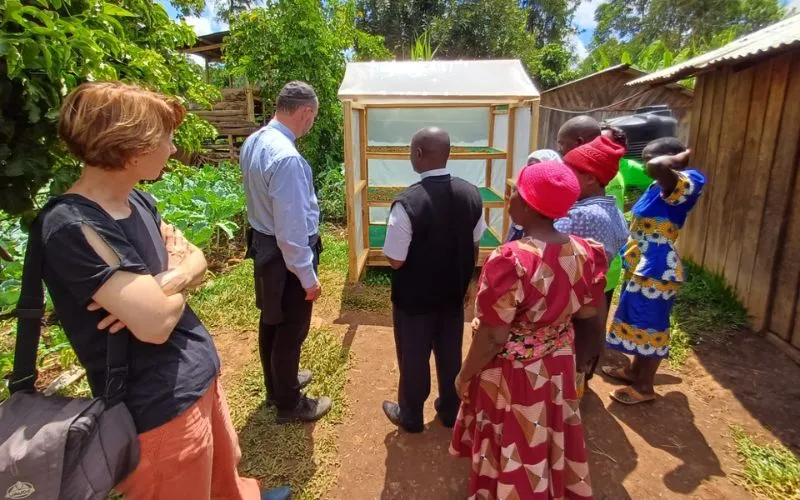 Credit: Misereor/Kenya
Credit: Misereor/Kenya
The Aachen-based Misereor official, who oversees Misereor projects in Kenya, South Sudan, and Sudan recognized the limitations of the civil societies in South Sudan, saying the context “is completely different because the State is in a difficult situation.”
“People can't directly link to the State there. I see that the Catholic Church is really a very important structure for the people,” she said referring to South Sudan, adding that the Catholic Church is “basically the only structure that is working for the people.”
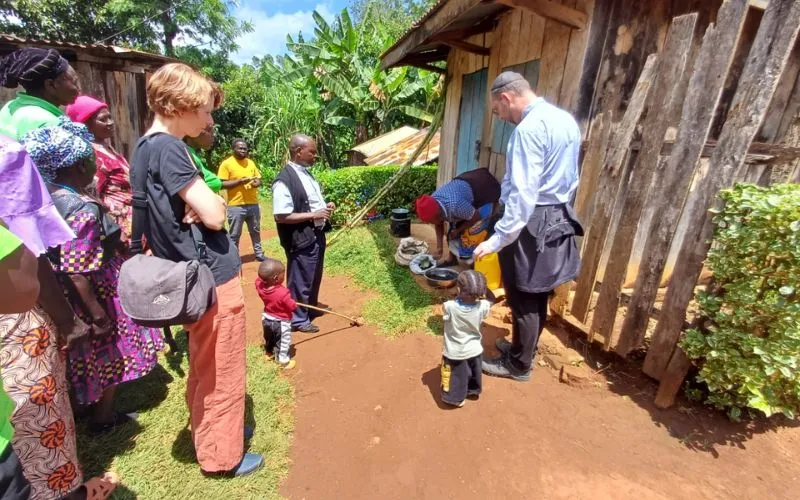 Fr. Andreas Frick and Katharina Götte with Caritas Embu Diocese partners. Credit: Misereor/Kenya
Fr. Andreas Frick and Katharina Götte with Caritas Embu Diocese partners. Credit: Misereor/Kenya
Katharina decried the situation of war in Sudan that broke out on 15 April 2023, saying some of the Misereor partners “had to stop their projects when the war started.”
“It is very tough and actually I think the world should take more responsibility in being engaged in Sudan, trying to support any kind of solution to stop this war,” she said, adding that people in the country are experiencing “much suffering ... it’s incredible; and I think we can't even imagine what they are going through.”
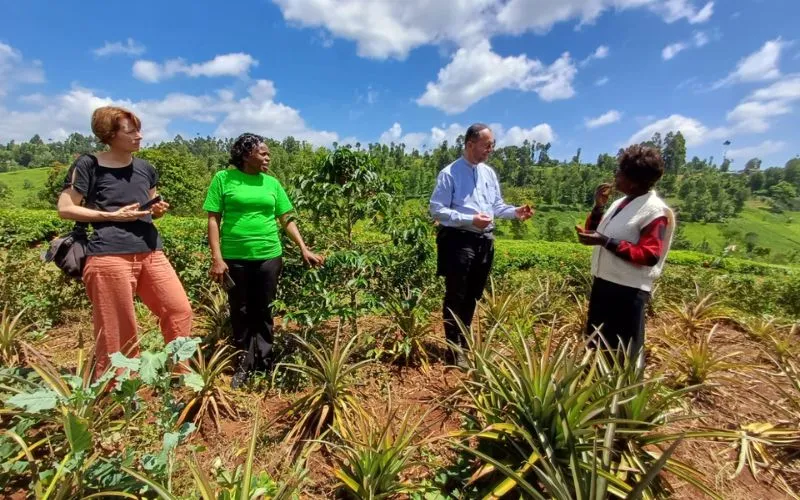 Credit: Misereor/Kenya
Credit: Misereor/Kenya
The Sudanese war, Katharina lamented, is a violent conflict that is “basically ignored by Europe. There is not much news coming from Sudan.”
“We had the Bishop of El Obeid Diocese in Aachen some weeks ago and he said the issue is that there are no news coming out of the country,” Katharina who oversees Misereor partnerships in Sudan, South Sudan, and Kenya said referring to Bishop Yunan Tombe Trille.
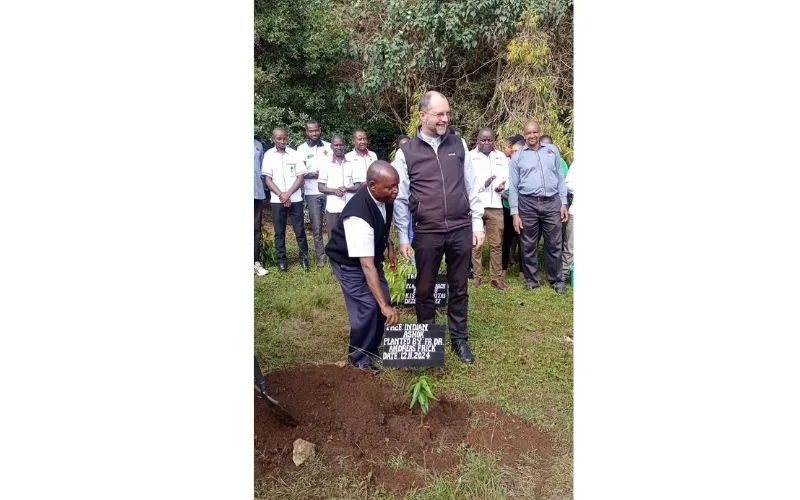 Credit: Misereor/Kenya
Credit: Misereor/Kenya
She went on to acknowledge with appreciation the diversity of Misereor partners in Kenya, who, she said, represent a “multitude of reality”.
“We have partners in the north working with the pastoralists on questions of land rights and also the strengthening of resilience, and due to climate change they are struggling with their livelihood,” she said, adding that Misereor has also “urban partners working in informal settlements but also partners doing human rights work, legal aid work. So, it's the diversity of things that are going on in Kenya that is always very impressive.”
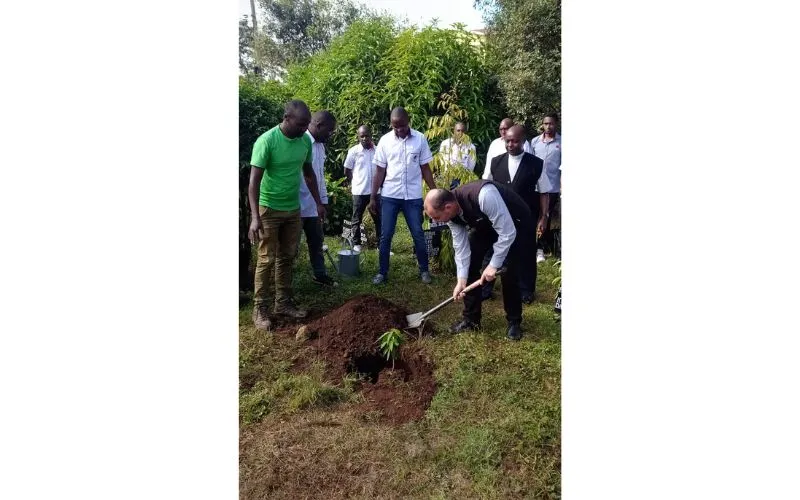 Credit: Misereor/Kenya
Credit: Misereor/Kenya
The Misereor official, whose annual visits to Kenya and South Sudan since 2018 was interrupted by the COVID-19 restrictions emphasized the important place of partners in the activities of Misereor.
“We always say (that) Misereor is nothing without the partners because the partners are the ones doing (much) work on the ground,” Katharina told ACI Africa.
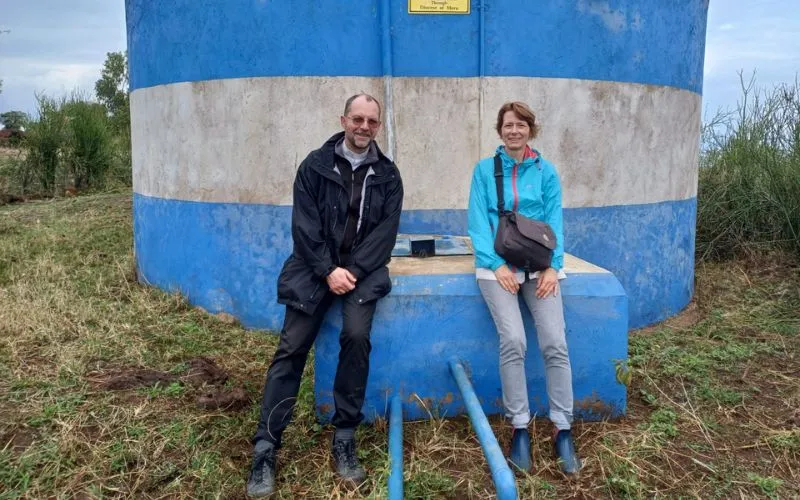 Fr. Andreas Frick and Katharina Götte at the Diocese of Meru Water and Sanitation Services (DOMWASS) project. Credit: Misereor/Kenya
Fr. Andreas Frick and Katharina Götte at the Diocese of Meru Water and Sanitation Services (DOMWASS) project. Credit: Misereor/Kenya
She added, “I'm always happy to see that our partners are really doing (much) work and having a huge impact with the people they are working with. I'm just happy that we are able to support them in this work.”
In the November 17 interview, Fr. Andreas also recognized the contribution of Misereor partners in realizing hope in the Kenyan society.
“There is so much power in the society of Kenya, in this part of Africa. I've seen now that the hope I had is already very much strengthened,” he said, and emphasizing the need for a collaborate approach to challenges in Africa, added, “In a big solidarity, we’ll overcome hunger, disease, poverty.”
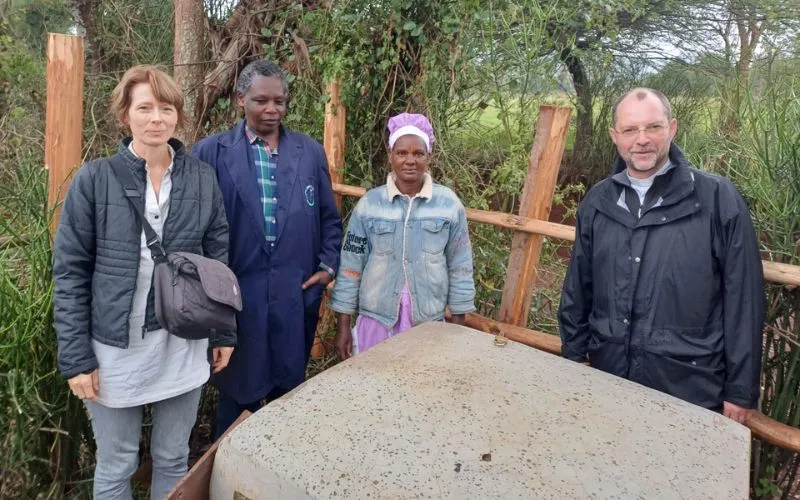 Fr. Andreas Frick and Katharina Götte with partners at the Diocese of Meru Water and Sanitation Services (DOMWASS) project. Credit: Misereor/Kenya
Fr. Andreas Frick and Katharina Götte with partners at the Diocese of Meru Water and Sanitation Services (DOMWASS) project. Credit: Misereor/Kenya
“We need networks, which don't forget any place and any person of the whole world,” Fr. Andreas told ACI Africa during the November 17 interview.
For him, the Catholic Church has effective networks to fill the gaps in people’s lives “because our single persons, communities, Religious people, Sisters, doctors, people around have the chance to be hands of God, because He's networking in the Holy Spirit as well through our hands.”
ACI Africa was founded in 2019. We provide free, up-to-the-minute news affecting the Catholic Church in Africa, giving particular emphasis to the words of the Holy Father and happenings of the Holy See, to any person with access to the internet. ACI Africa is proud to offer free access to its news items to Catholic dioceses, parishes, and websites, in order to increase awareness of the activities of the universal Church and to foster a sense of Catholic thought and culture in the life of every Catholic.
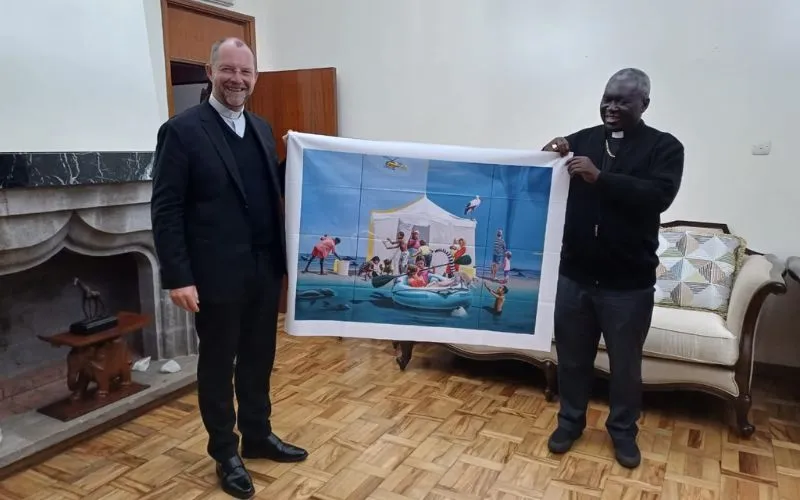 Fr. Andreas Frick (left) and Archbishop Philip Anyolo of Nairobi Archdiocese (right) displaying the new Lenten image. Credit: Misereor/Kenya
Fr. Andreas Frick (left) and Archbishop Philip Anyolo of Nairobi Archdiocese (right) displaying the new Lenten image. Credit: Misereor/Kenya


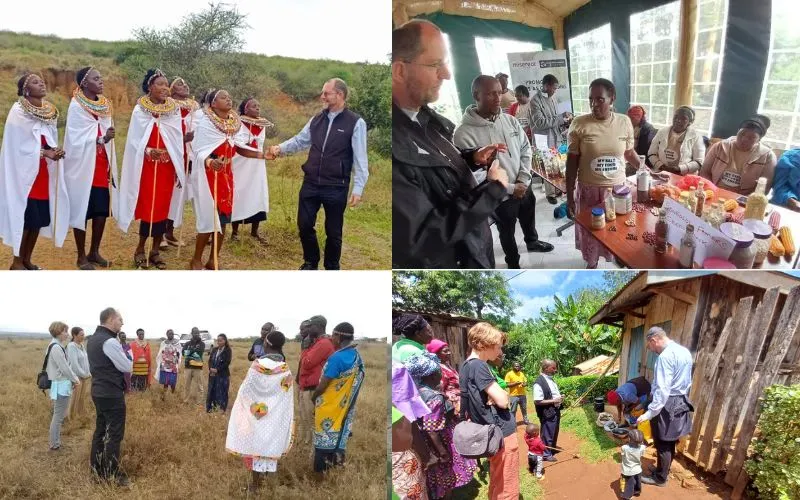
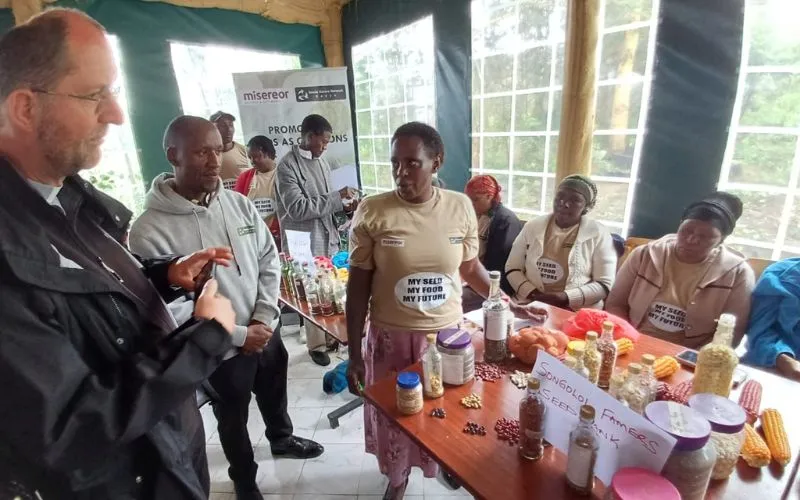 Fr. Andreas Frick with Seed Savers partners. Credit: Misereor/Kenya
Fr. Andreas Frick with Seed Savers partners. Credit: Misereor/Kenya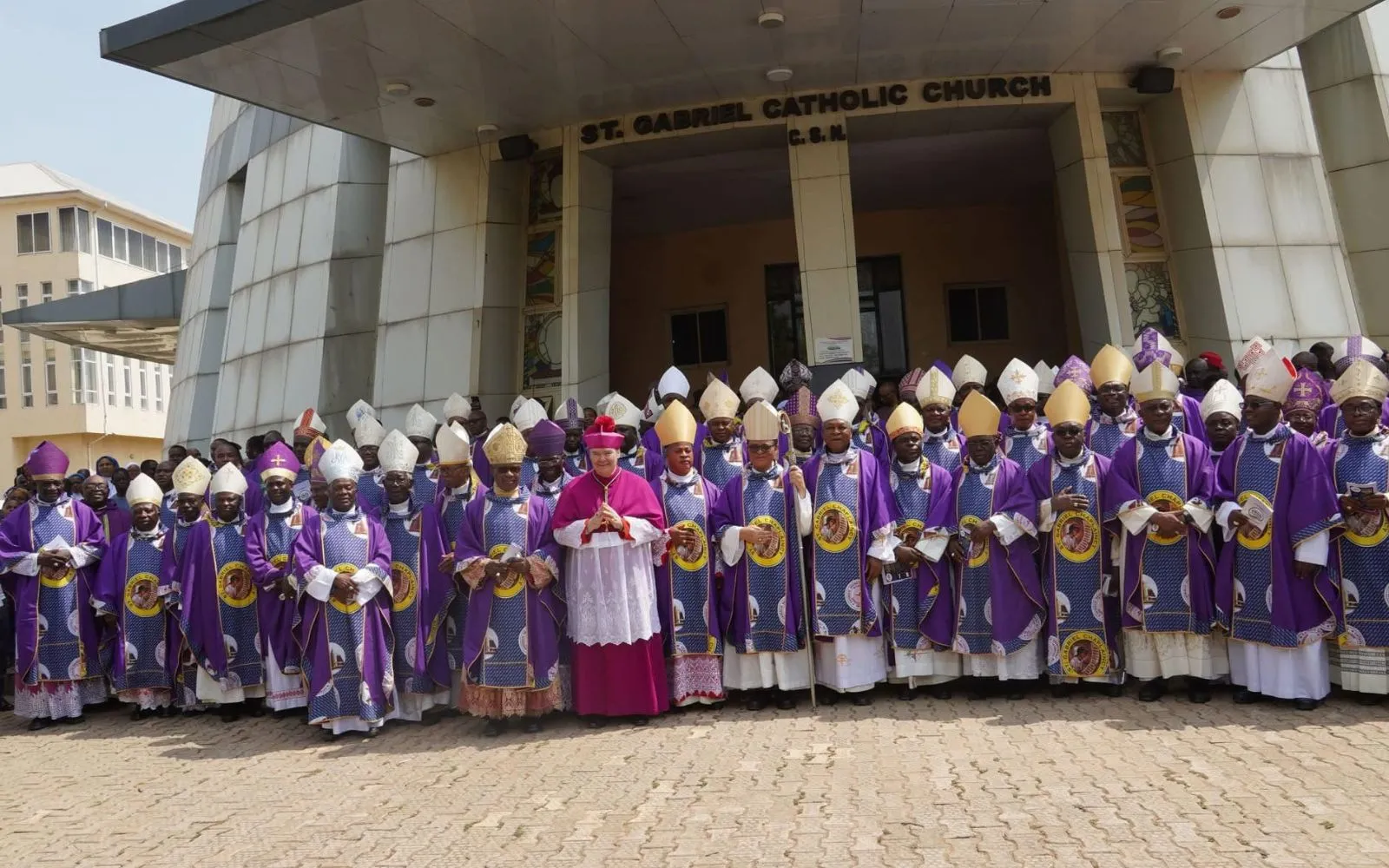
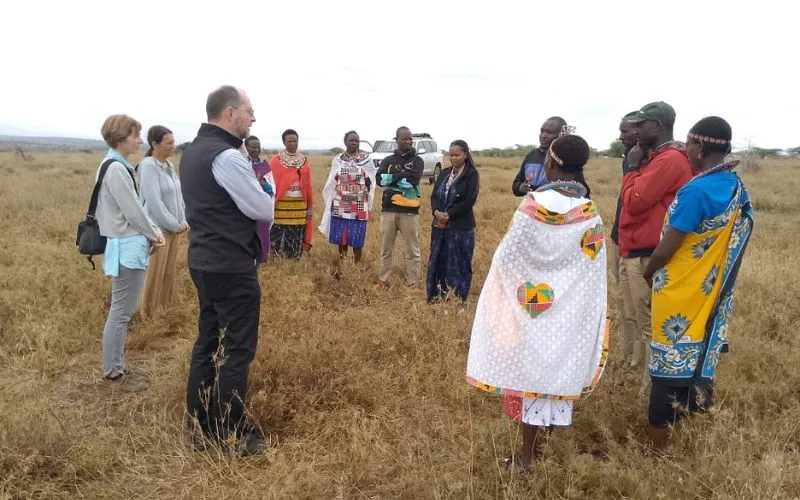 Fr. Andreas Frick, Katharina Götte with IMPACT Trust partners in Laikipia North. Credit: Misereor/Kenya
Fr. Andreas Frick, Katharina Götte with IMPACT Trust partners in Laikipia North. Credit: Misereor/Kenya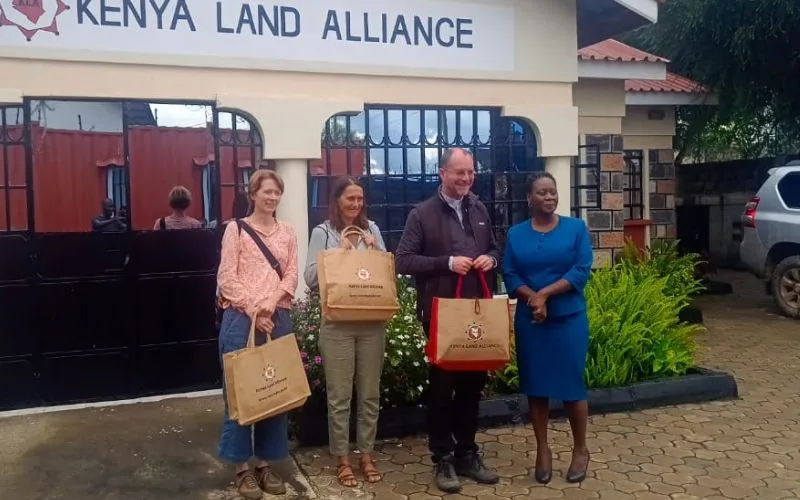 From left: Katharina Götte, Kamila, Fr. Andreas Frick, and Kenya Land Alliance representative. Credit: Misereor/Kenya
From left: Katharina Götte, Kamila, Fr. Andreas Frick, and Kenya Land Alliance representative. Credit: Misereor/Kenya Rehabilitated borehole in Laikipia North. Credit: Misereor/Kenya
Rehabilitated borehole in Laikipia North. Credit: Misereor/Kenya Fr. Andreas Frick with Seed Savers partners in Gilgil, Nakuru Diocese. Credit: Misereor/Kenya
Fr. Andreas Frick with Seed Savers partners in Gilgil, Nakuru Diocese. Credit: Misereor/Kenya Fr. Andreas Frick and Katharina Götte meeting Misereor partners in Huruma, Nairobi Archdiocese. Credit: Misereor/Kenya
Fr. Andreas Frick and Katharina Götte meeting Misereor partners in Huruma, Nairobi Archdiocese. Credit: Misereor/Kenya Credit: Misereor/Kenya
Credit: Misereor/Kenya Credit: Misereor/Kenya
Credit: Misereor/Kenya Fr. Andreas Frick at Don Bosco Technical Institute, Catholic Diocese of Embu.Credit: Misereor/Kenya
Fr. Andreas Frick at Don Bosco Technical Institute, Catholic Diocese of Embu.Credit: Misereor/Kenya Credit: Misereor/Kenya
Credit: Misereor/Kenya Credit: Misereor/Kenya
Credit: Misereor/Kenya Credit: Misereor/Kenya
Credit: Misereor/Kenya Credit: Misereor/Kenya
Credit: Misereor/Kenya Fr. Andreas Frick and Katharina Götte with Caritas Embu Diocese partners. Credit: Misereor/Kenya
Fr. Andreas Frick and Katharina Götte with Caritas Embu Diocese partners. Credit: Misereor/Kenya Credit: Misereor/Kenya
Credit: Misereor/Kenya Credit: Misereor/Kenya
Credit: Misereor/Kenya Credit: Misereor/Kenya
Credit: Misereor/Kenya Fr. Andreas Frick and Katharina Götte at the Diocese of Meru Water and Sanitation Services (DOMWASS) project. Credit: Misereor/Kenya
Fr. Andreas Frick and Katharina Götte at the Diocese of Meru Water and Sanitation Services (DOMWASS) project. Credit: Misereor/Kenya Fr. Andreas Frick and Katharina Götte with partners at the Diocese of Meru Water and Sanitation Services (DOMWASS) project. Credit: Misereor/Kenya
Fr. Andreas Frick and Katharina Götte with partners at the Diocese of Meru Water and Sanitation Services (DOMWASS) project. Credit: Misereor/Kenya


